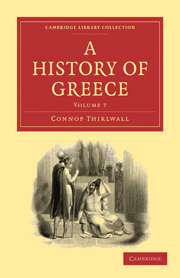Book contents
- Frontmatter
- Contents
- ERRATA
- CHAPTER LIII ALEXANDER'S CAMPAIGNS IN INDIA TO HIS RETREAT FROM THE HYPHASIS
- CHAP. LIV ALEXANDER'S PASSAGE DOWN THE INDUS AND RETURN TO SUSA
- CHAP. LV FROM ALEXANDER'S RETURN TO SUSA TO HIS DEATH
- CHAP. LVI FROM THE DEATH OF ALEXANDER TO THE END OF THE LAMIAN WAR
- CHAP. LVII FROM THE END OF THE LAMIAN WAR TO CASSANDER'S OCCUPATION OF ATHENS
- CHAP. LVIII FROM CASSANDER'S OCCUPATION OF ATHENS TO THE TREATY BETWEEN ANTIGONUS AND PTOLEMY, CASSANDER AND LYSIMACHUS, IN 311 B. C.
- CHAP. LIX FROM THE PEACE OF 311 TO THE BATTLE OF IPSUS
CHAP. LIX - FROM THE PEACE OF 311 TO THE BATTLE OF IPSUS
Published online by Cambridge University Press: 05 July 2011
- Frontmatter
- Contents
- ERRATA
- CHAPTER LIII ALEXANDER'S CAMPAIGNS IN INDIA TO HIS RETREAT FROM THE HYPHASIS
- CHAP. LIV ALEXANDER'S PASSAGE DOWN THE INDUS AND RETURN TO SUSA
- CHAP. LV FROM ALEXANDER'S RETURN TO SUSA TO HIS DEATH
- CHAP. LVI FROM THE DEATH OF ALEXANDER TO THE END OF THE LAMIAN WAR
- CHAP. LVII FROM THE END OF THE LAMIAN WAR TO CASSANDER'S OCCUPATION OF ATHENS
- CHAP. LVIII FROM CASSANDER'S OCCUPATION OF ATHENS TO THE TREATY BETWEEN ANTIGONUS AND PTOLEMY, CASSANDER AND LYSIMACHUS, IN 311 B. C.
- CHAP. LIX FROM THE PEACE OF 311 TO THE BATTLE OF IPSUS
Summary
The treaty of 311 was almost immediately followed by a tragical event, which may be considered as the natural consequence of one of its conditions. From the beginning of the war the young king Alexander and his mother had been kept in close custody at Amphipolis, without the attendance befitting their rank. Cassander by this treatment had given sufficient evidence of his ultimate intentions with regard to them. He probably only waited until the Macedonians should have been reconciled to the spectacle of their degradation, and have forgotten them, to rid himself of them for ever. The declaration however, which Antigonus made in their favour on his return from the East, may have revived the hopes of those who were still attached to the royal house: and the treaty, which solemnly recognised Alexander's title to the crown, must have excited still more sanguine expectations. The young prince was now about sixteen, the age at which his father had been entrusted with the government of the state, and the command of armies. His partisans openly expressed their wish to see him immediately released from confinement, and placed on the throne. That they were instigated to this injudicious display of their loyalty, which without any benefit to its object could not but alarm Cassander, and put him on his guard, by any secret machinations of Antigonus, seems a very needless conjecture: Antigonus might safely anticipate that the terms of the treaty would produce this effect, and he was probably able to divine its remoter consequences.
- Type
- Chapter
- Information
- A History of Greece , pp. 318 - 370Publisher: Cambridge University PressPrint publication year: 2010First published in: 1840



